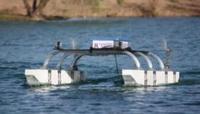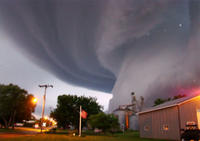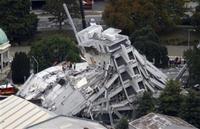-
The bicycle's next frontier: disaster response

Cities in seismically active regions are examining their emergency response policies in the wake of the March 2011 tsunami in Japan; the city of Portland, Oregon, as well as citizen-led Neighborhood Emergency Teams(NET), have been including the cargo bike in their emergency response plans
-
-
Planetary exploration vehicle for earthly search-and-rescue missions

A researcher develops a NASA-sponsored autonomous lake lander for the purpose of exploring lakes on distant planets; this mission is many years in the future; in the meantime, the vehicle is ready to deploy on missions related to defense and security, such as harbor surveillance and cleanup operations of littoral munitions dumps and mines; it is also ideal for search-and-rescue operations in oceans, lakes, and hazardous environments, as well as for environmental research projects
-
-
Brown graduate students help bankrupt city create disaster plan
To help the cash-stricken city of Central Falls, Rhode Island, thirty graduate students from Brown University have banded together to help create a disaster preparedness plan
-
-
Study shows violence against women increases following disasters
A new study shows that in the aftermath of a devastating natural disaster domestic violence against women tends to increase
-
-
Nebraska debates disaster housing fund
Legislators in Nebraska are currently debating a law that would create a $2.5 million temporary housing fund for families who lose their homes in natural disasters
-
-
Virginia receives $40 million in federal disaster aid following quake
Following the rare east coast earthquake last year, Virginia has received nearly $40 million in federal disaster aid
-
-
Study finds disaster survivors more prone to fatal mistakes
A new study concludes that survivors of traumatic natural disasters may suffer from a decline in mental capabilities causing them to make grave errors in their daily lives
-
-
Apps, digital tools to help cope with disasters
The Department of Health and Human Services has posted on its Web a list of apps and digital tools which would help individual cope with disasters and the challenges disasters pose
-
-
Florida blood service upgrades storage systems
Florida Blood Services has replaced three disparate storage systems with the Nimble CS240 converged storage array; FBS says the new storage operation allows FBS more efficient and centralized storage for FBS’s headquarters and forty field offices
-
-
Tax breaks for disaster victims
This year victims of natural disasters may be eligible for a generous break on their taxes
-
-
2011 natural disasters cost U.S. insurers more than $32 billion

2011 saw U.S. government set record for disaster declarations; the severity of the disasters set a record as well, with twelve separate billion-dollar weather/climate disasters in 2011, with an aggregate damage total of approximately $52 billion (this number reflects both insured and uninsured losses)
-
-
Building design lessons from the Christchurch earthquake

A leading infrastructure expert believes an assessment needs to be made of the level of “very rare” earthquake that needs to be considered in structural design, perhaps one with a 10,000 year return period or higher, rather than the 500 year return period that is commonly adopted for many buildings in Australia
-
-
Turkish PM criticizes builders for unsafe practices
Sunday’s 7.2 tremor in Turkey killed at least 460 people, injured 1,350, destroyed more than 2,000 buildings, and displaced thousands; Turkish prime minister harshly criticizes Turkish builders, saying negligence amounts to murder
-
-
USAID, Swiss Re Partnership Targets Hunger, Natural Disasters
USAID and Swiss Re a few days ago announced a 3-year partnership to help vulnerable communities fight hunger, build resilience to climate change, and reduce the costs of natural disasters in the Americas, Africa, and Asia
-
-
Public-private partnership in homeland security
The Homeland Security and Defense Business Council says that job of securing the U.S. homeland is an extensive and daunting mission that cannot be accomplished by government alone; it requires that the United States, collectively, become a resilient nation, with the capabilities needed to prepare for, protect against, respond to, recover from, and mitigate against all threats
-
- All
- Regional
- Water
- Biometrics
- Borders/Immig
- Business
- Cybersecurity
- Detection
- Disasters
- Government
- Infrastructure
- International
- Public health
- Public Safety
- Communication interoperabillity
- Emergency services
- Emergency medical services
- Fire
- First response
- IEDs
- Law Enforcement
- Law Enforcement Technology
- Military technology
- Nonlethal weapons
- Nuclear weapons
- Personal protection equipment
- Police
- Notification /alert systems
- Situational awareness
- Weapons systems
- Sci-Tech
- Sector Reports
- Surveillance
- Transportation
Advertising & Marketing: advertise@newswirepubs.com
Editorial: editor@newswirepubs.com
General: info@newswirepubs.com
2010-2011 © News Wire Publications, LLC News Wire Publications, LLC
220 Old Country Road | Suite 200 | Mineola | New York | 11501
Permissions and Policies
Editorial: editor@newswirepubs.com
General: info@newswirepubs.com
2010-2011 © News Wire Publications, LLC News Wire Publications, LLC
220 Old Country Road | Suite 200 | Mineola | New York | 11501
Permissions and Policies
